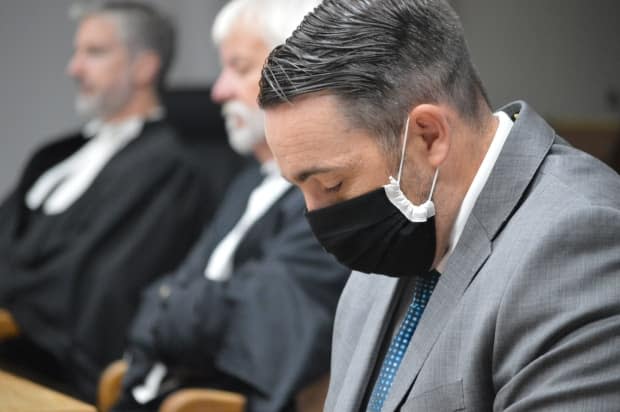Doug Snelgrove mistrial 'has nothing to do with justice,' advocates say
The first time around, it ended in acquittal.
That was 2017. Protests erupted, then, in support of the complainant.
The second time around, those supporters have been left waiting for what might become a third attempt at a verdict in the case of police officer Doug Snelgrove.
"This is cruel and unjust to put someone through a third trial," said women's advocate Jenny Wright, who, like others in the province, has been watching the case closely since the officer's arrest in 2015.
But Royal Newfoundland Constabulary Const. Doug Snelgrove walked free again on Friday morning. He has been charged with one count of sexual assault for an encounter in 2014.
He testified again last week to having sex with the complainant, then 21, after driving her home. The woman says she was so drunk she can't remember much of the encounter, and cannot recall consenting to have sex with him.
After his acquittal in 2017, a new trial was ordered. That ended Friday after the jury had begun deliberations, with the judge declaring a mistrial due to his own error in jury selection.
"This trial had a huge, significant impact on this community," Wright said, suggesting its early death Friday has shaken confidence in the province's justice system.
Wright said only two to eight per cent of sexual assault victims come forward. Those who do, she said, find the process of a trial overwhelming.
"Women tell us at the end of it, there was no justice — that if they were to do it again, they wouldn't go through that system again," she said.
"And we simply just can't have a justice system that harms women in this way."
Sex assault training for judges
Rosel Kim, a lawyer with the Women's Legal Education and Action Fund, says defence counsel in sexual assault trials often rely on poking holes in a complainant's testimony.
That's harmful for any complainant who has to explain herself under duress.
"Generally I would say the criminal justice system does not serve the interests of the complainants very well," Kim said. It's worse in sex assault cases, she added, as normally, there aren't any witnesses and a case could be complicated by issues such as intoxication.
Both Wright and Kim say the legal system itself requires reform.

Kim points to Bill C-5, which had its first reading in Ottawa in February.
The bill would require new judges to take classes in sexual assault as a condition of their appointment. "Sexual assault law is a complex area of the law," Kim said.
"It involves a lot of structural inequality — which includes misogyny, power dynamics and the impact of trauma on survivors' behaviours and memory."
Wright says she's pushed for similar training, or the development of special sexual violence courts that understand trauma.
On Friday, the re-trial judge, Garrett Handrigan, incorrectly dismissed the additional jurors brought on as fail safes, in case any jurors dropped out. The Crown requested that the judge consider his mistake a technicality and continue with the re-trial. Defence lawyers for Snelgrove requested a mistrial.
"This is where the system is broken. This is where the system really harmed," Wright said.
"If you weigh the balance of how that might affect the validity of the trial, the validity of all that testimony over the incredible harm a third trial is going to do to that victim, to the public's sense of safety ... it absolutely makes no sense, and it has absolutely nothing to do with justice in this case."
Read more from CBC Newfoundland and Labrador

